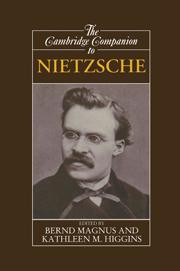Book contents
- Frontmatter
- Introduction to the Cambridge companion to Nietzsche
- Part I Introduction to Nietzsche's works
- Part II The use and abuse of Nietzsche's life and works
- Part III Nietzsche as philosopher
- 5 Nietzsche's kind of philosophy
- 6 Nietzsche ad hominem
- 7 Nietzsche, modernity, aestheticism
- 8 Nietzsche's alleged farewell
- Part IV Nietzsche's influence
- Selected bibliography
- Index
7 - Nietzsche, modernity, aestheticism
from Part III - Nietzsche as philosopher
Published online by Cambridge University Press: 28 May 2006
- Frontmatter
- Introduction to the Cambridge companion to Nietzsche
- Part I Introduction to Nietzsche's works
- Part II The use and abuse of Nietzsche's life and works
- Part III Nietzsche as philosopher
- 5 Nietzsche's kind of philosophy
- 6 Nietzsche ad hominem
- 7 Nietzsche, modernity, aestheticism
- 8 Nietzsche's alleged farewell
- Part IV Nietzsche's influence
- Selected bibliography
- Index
Summary
A long line of philosophers, from Plato to Aquinas, from Descartes to Kant, from Hegel to Heidegger, have composed their works at least partly out of concern with the broader social and cultural events of their time. Yet, for a variety of reasons, it is Nietzsche who is most often read as addressing directly the issues and problems created by his historical period. In particular, we regularly concentrate on his views on what is tendentiously referred to as “the problem ” of Modernity. Some see him merely as a diagnostician of that problem,- others also find in his work a solution to it; still others consider him as one of its most telling and poignant parts. It might therefore not be inappropriate to approach Nietzsche by means of an examination of his attitude toward Modernity and its “problem” in the hope that we might thereby reach an understanding of some of his general philosophical ideas.
- Type
- Chapter
- Information
- The Cambridge Companion to Nietzsche , pp. 223 - 251Publisher: Cambridge University PressPrint publication year: 1996
- 3
- Cited by



